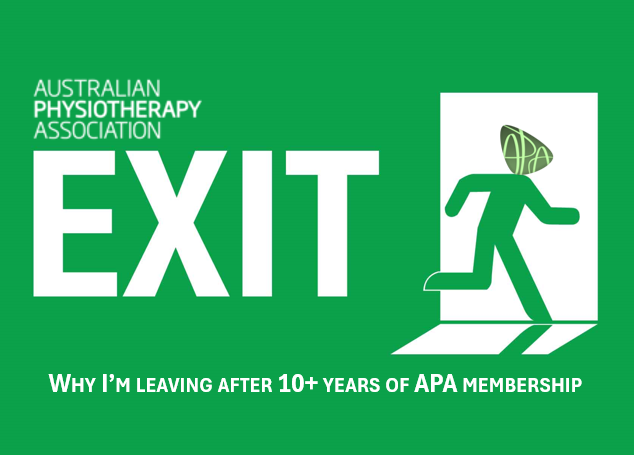Why I’m leaving the APA after 10+ years of membership
So long APA, and thanks for all the fish.
The Australian Physiotherapy Association (APA) is the professional body for Physiotherapists in Australia. Physiotherapists pay a premium to be a member and bundled into that membership is:
Professional Indemnity Insurance
Continuing Professional Development (CPD) discounted events and courses
Advocacy of the trade
Advocacy of APA members
A career progression pathway (Titling Program)
Mentoring Programs
Business Support
..and a few other odds and ends.
Many APA members are simply APA members because:
They were given free APA membership as Physio students, and
They think they need APA membership to be insured… not knowing there’s other (cheaper) insurers out there.
For over 10 years I have been a member of the APA, primarily for CPD opportunities and insurance.
I will say this loud and clear, as I’ve once sat on an APA committee and know many who are directly involved with the APA:
I believe APA is full of lovely people and professionals who are genuinely interested in seeing the best for Physiotherapy and the APA members. I do believe they have best intentions in mind for its membership. They are the public face of Physiotherapy in Australia and work very hard to improve the public image of our trade.
There, I said it, and I do mean it.
Now I’ll continue:
I will now be walking away from APA membership. There’s simply no value for me at this stage in my career as a Musculoskeletal Clinician.
At risk of copping the inevitable:
“FINE! SEE YA! WE DON’T NEED YA! DON’T LET THE DOOR HIT YOUR ASS ON THE WAY OUT”
….I will continue.
Who am I?
I guess I’m a rare breed when it comes to a typical APA member.
I am extremely happy and comfortable with myself. I love my job. I have a great patient base and external network of GPs, Specialists, and Allied Health professionals (including those pesky Exercise Physiologists who are “stealing all of our jobs” — more to come on that).
I am trusted as someone who is no nonsense, works very hard in the clinic for the patients and my team. I work many hours out of the clinic to stay up to date with the research, including regular ongoing learning and CPD from a variety of media and sources (very little of which are from the APA).
I provide a high value, evidence-based, holistic (integrative medicine) pain and injury rehabilitation service and the majority of my patients are very satisfied with seeing me for less appointments/case on average at a lower cost to them.
Here are the key areas the where APA should be providing value to me:
Insurance
APA membership has professional indemnity insurance bundled into it, however there are no options to customise it. This insurance can be gained elsewhere at less than half the cost of an APA membership. There has never been an option to customise the insurance, it’s always the highest level of coverage — for those of us who operate on a low-risk basis (not performing cervical spine manipulations etc) we don’t need the top tier ($20million coverage).
I don’t need insurance with APA to do my job well.
Continuing Professional Development (CPD)
The APA once had a monopoly on CPD. However, they are now one CPD provider in an ever growing marketplace of Physiotherapy and Musculoskeletal CPD giants.
Physio Network, SportsMAP, Learn.Physio, Clinical Edge and many more are offering better value and cutting edge CPD courses and events, attracting presenters who are the best in the business.
I don’t need CPD with the APA to do my job well.
Titling Program and Career Progression
The APA offers a Titling program. According to the APA it’s a way to:
“promote high clinical standards and demonstrate to external bodies that we are committed to it, thus raising the profile and credibility of Physiotherapy”.
It’s also meant to help to ‘Titled Physiotherapists’:
“market themselves, get paid more, attract new clientele, open doors to ‘greater opportunities’, get internal recognition from peers, increase personal satisfaction“
…..et cetera.
But it’s not very attractive to me.
We are in a financial cost of living crisis (in case you’ve been living under a rock or a stack of gold bullion as Titled Physios presumably are). I was only just recently able to clear the student loan debt of the two university degrees had to undertake to get to this ‘untitled’ stage. I have no further wish to get another $30,000-$50,000 of student loan debt just so I can:
· Increase my personal satisfaction — titles and post-nominals do not tickle my satisfaction-lobe.
· Put “APA Titled” in front of my occupation on emails and websites — the public and external providers I’ve surveyed frankly don’t care or understand what these titles mean.
· Get internal recognition by my peers — I simply don’t want or need this to do a good job, I want external recognition of my experience, expertise, education and self-alleged ‘high standard of practice’. If I pay $30-$50k and have put in years of work, I want access to Medicare Bulk Billed services such as bulk billed diagnostic imaging and direct referrals to Specialists so I can do a better job for my patients. I never stop hearing how overburdened GPs are by the AMA and RACGP, I’m sure they have their tendrils in the Medicare decision making at the top level and they’re not greasing the wheels for Physiotherapy. Very experienced Physios in the past have told me it’s been like that for generations and it’ll be unlikely to change soon.

Maybe once we get external recognition, then we can:
· Get paid more and attract new clientele — without “titles”. Until we get external recognition I refuse to make myself more expensive for my patients, especially in this financial climate, when that increased cost should be covered by Medicare or Private Health Insurers due to a recognised ‘high standard of care’.
I’m pretty sure the external bodies will continue to operate the same way they always do, they will recognise and refer to those who consistently do the job well — titled or not.
In the meantime, the APA have unwittingly created an environment where (en)Titled Physios have weaponised titling to push an elitism agenda, this is one example pulled word-for-word from an Australian Physiotherapy Private Practice website:
“Expert Team
Best in class physios achieve best in class results. You deserve professionals who are dedicated to results. Our physio have all done at least 2 university degrees and are either Titled Physios (top 5%) or Doctor of Physiotherapy graduates. We pride ourselves on being the best in the business in communication, qualifications, results and realistic expectations.”
No, that’s not parody, that is real. It’s a screenshot from the website from a private physiotherapy practice in Australia. It seems some have confused the words ‘Titled’ and ‘Entitled’. But what would I know, I’m untitled, patients deserve better than me, a less dedicated Physio. These guys are the top 5% , the the best in the business with their communication, especially after all their “physio” have “done” all those degrees.
I’m already a ‘Musculoskeletal Physiotherapist’ — I guess that’s my own “title”. One of those words (“Physiotherapist”) I earned and is protected by national law. The other is a big word that helps the public and my external providers know where my expertise lies — Musculoskeletal healthcare. Very few Physiotherapists are unaware they can title themselves as a “Sports and Exercise Physiotherapist” or a “Musculoskeletal Physiotherapist”…. you just can’t say “APA titled”.
I don’t need to be “APA titled” to do my job well.
Advocacy
I don’t need to be a member of the APA to reap the rewards that might come my way from the APAs Advocacy of this trade. If they are already selling us as a “high standard of care” trade then what other input does the APA need from me. I’ll just keep consistently doing a good job on my end — as recommended by trusted and highly respected Physiotherapy mentors who’ve been in this trade for decades who’ve seen not much change over that time in this space.
The APA always appears to be ‘looking out’ to sell us, instead of ‘looking in’ to better us. There is much talk from the APA about what is ‘high standard of care’ however there is very little talk of what is ‘low standard of care’, lest they upset a portion of their paying membership. I think we need to start having this talk, I think we need Leadership amongst the ranks instead of Advocacy for the ranks.
Perhaps if we can raise the level of the low bar that currently exits in Physiotherapy where we have very low value ‘alternative’ treatments sneaking in such as Reiki, Visceral Manipulation and blowing up balloons in the aim of fixing a diaphragm dysfunction that doesn’t exist, it might go some way to improving Advocacy.

We still even have Physios out there consulting with two patients at once, and some even still have 20min appointments — which in my opinion is too short a time for both the patient and the Physiotherapist to do a decent job. Some Physiotherapy businesses force their new graduates to become Pilates instructors just to bring in revenue, rather than focusing on their clinical skills. No wonder there’s a high level of burnout in young Physios. We have Principal Physiotherapists in some practices enforcing a blanket “book them in for 2 sessions/week” rule for Workers Comp patients. Disgusting.
We need leadership and strong convictions with little care for hurt feelings from low quality service providers. Then maybe we stand a chance when we have aggressive campaigns such as the DVA campaign. The DVA campaign where APA requested its members write to (spam) the Minister for Veterans Affairs, via the members local federal MPs, using a provided template. This campaign fell on deaf ears and the Minister for Veteran Affairs provided patronising responses to these letters from APA members, outlining the pitiful increase in DVA fees that we will get that don’t even keep up with indexation.
NDIS Minister Bill Shorten recently joined the MCPI (Ministerial Club of Physiotherapy Indifference), when he expressed his concerns that some in the Physiotherapy profession are engaging in unethical conduct.
Perhaps the Minister for Veteran Affairs experienced a wayward acupuncture needle or had a bad session of cupping in the past from his local Physio and he holds a grudge against the entire trade. Maybe the NDIS Minister Bill Shorten had a terrible Physiotherapy experience with a wayward acupuncutre needle.
I often meet with groups of GPs in their practices and there are some common discussion points:
“Do you do dry needling?” (I tell them no) “Oh thank god, we’ll send you referrals”
“Do you do the GLA:D program?” (I tell them yes) “Oh thank god, we’ll send you referrals”
I think two things here, 1) GPs are sick of low value Physio care as well — especially care where risks (infection) outweigh the rewards, and 2) they prefer a recipe program for chronic disease management (eg osteoarthritis for GLA:D knee program) than a possibly more effective program individualised to each patient because they can be assured that the Physio running the program isn’t going to go off the recipe and do some sort of nonsense on the side.
We need APA leadership to call out and weed out low value, and sometimes unsafe, physiotherapy standards so we can not seem like we’re on a high horse and ‘throwing stones in a glass house’ when, for example, we start a ‘Turf War’ against Exercise Physiologists. The APA recently produced a “factsheet” designed to clarify the difference between Physiotherapists and Exercise Physiologists. The intention seemed to be to highlight the expertise, of physiotherapists, focusing on the jack-of-all-trades (master of none?) scope of Physiotherapy, emphasizing Physiotherapists registration and longstanding presence in healthcare. So far so good, right?
But then comes a section with a barbed title ‘ensuring a safer healthcare system’, where the APA outlines how physiotherapy safety and scope of practice are safeguarded by the National Registration and Accreditation Scheme, whereas those pesky Exercise Physiologists aren’t.
The optics on this factsheet aren’t great, Exercise Physiology has been portrayed as an unregistered, unsafe and unregulated profession with limited scope beyond prescribing squats and doing hydrotherapy. Whereas, Physiotherapy comes across as a little insecure about EPs taking all of our jobs. What a doozy.
But here’s the irony: I’ve never had more referrals from external providers in the last 18 months and it’s because I work side-by-side with Exercise Physiologists. It was a missed opportunity to capitalise on being “Allied” with Allied Health.
I don’t need APA advocacy to do my job well.
I won’t be renewing my Membership in 2024
I have nothing to gain from APA CPD, Advocacy and its Career Progression Pathway and the cost of membership is over twice the amount of professional indemnity insurance gained elsewhere.
It would be naïve of me to adopt an optimistic activist type approach to the perceived issues I have within my trade, being part of the solution simply by joining the APA machine would be the equivalent of fixing a Nation by becoming a politician.
For those that say, “why do you voice these concerns publicly, why not direct them to APA?”…. I have, on a few occasions. Either the APA ‘Ghosted’ me (when contacting them about the Physio vs EP “factsheet”) or they said they’d get back to me (but never did) regarding questions I had about the Titling pathway and whether the investment will pay of via recognition with external providers and the medicare system.
I’ll be back (I hope)
I’ll consider re-joining if I see the following from the APA:
Not just championing high value healthcare — but challenging low value healthcare.
If Titling means something — Meaningful external recognition of APA Titled Physiotherapists including Medicare bulk billing for Diagnostic Imaging (on par with GPs) and relevant Specialist referrals.
If Insurance options are customisable ($20m, vs $10m, vs $5m).
To the APA, thanks for having me. It was fun, then amusing, then less amusing, then sad, then hopeful, then sad again, then not great, then embarrassing, and then sad once again.
Thanks for all the magazines filled with advertisements for shonky APA endorsed products. Thanks for the canapes at APA Forums and Conferences. Thanks for the APA water bottles, the APA pens, the APA notepads, the Golden APA Email Signatures, the committees and sub-committees, the sub-sub-sub committees.
To quote my Mother:
“I’m not angry, I’m just disappointed. You have so much potential” *sigh*
and to quote Douglas Adams:
“So long, and thanks for all the fish”.
(it’s a vague and dated reference but I’m sticking with it.)












